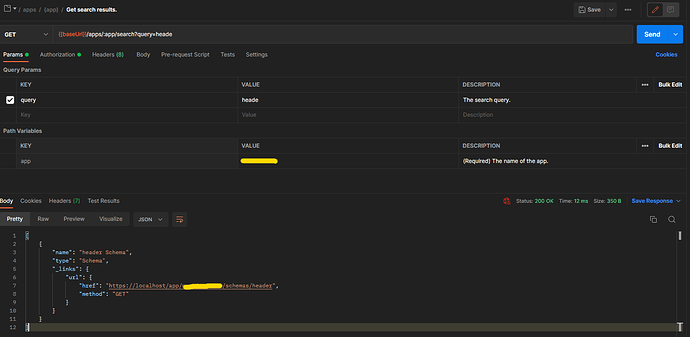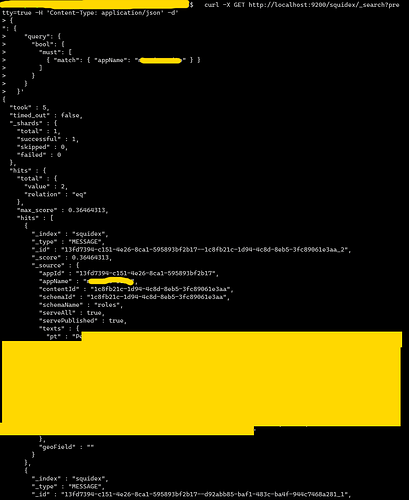I have…
- [X] Read the following guideline: https://docs.squidex.io/01-getting-started/installation/troubleshooting-and-support. I understand that my support request might get deleted if I do not follow the guideline.
I’m submitting a…
- [X] Bug report
Current behavior
Trying to configure Elastic Search as the FullText store.
When starting squidex image, the following error appears in the logs and squidex image stops:
Unhandled exception. System.InvalidOperationException: Failed with ${“error”:{“root_cause”:[{“type”:“index_not_found_exception”,“reason”:“no such index [squidex]”,“resource.type”:“index_or_alias”,“resource.id”:“squidex”,“index_uuid”:“na”,“index”:“squidex”}],“type”:“index_not_found_exception”,“reason”:“no such index [squidex]”,“resource.type”:“index_or_alias”,“resource.id”:“squidex”,“index_uuid”:“na”,“index”:“squidex”},“status”:404}
—> Elasticsearch.Net.ElasticsearchClientException: Request failed to execute. Call: Status code 404 from: PUT /squidex/_mapping. ServerError: Type: index_not_found_exception Reason: “no such index [squidex]”
— End of inner exception stack trace —
at Squidex.Extensions.Text.ElasticSearch.ElasticSearchIndexDefinition.ApplyAsync(IElasticLowLevelClient elastic, String indexName, CancellationToken ct) in /src/extensions/Squidex.Extensions/Text/ElasticSearch/ElasticSearchIndexDefinition.cs:line 126
at Squidex.Hosting.InitializerHost.StartAsync(CancellationToken cancellationToken)
at Microsoft.Extensions.Hosting.Internal.Host.StartAsync(CancellationToken cancellationToken)
at Microsoft.Extensions.Hosting.HostingAbstractionsHostExtensions.RunAsync(IHost host, CancellationToken token)
at Microsoft.Extensions.Hosting.HostingAbstractionsHostExtensions.RunAsync(IHost host, CancellationToken token)
at Microsoft.Extensions.Hosting.HostingAbstractionsHostExtensions.Run(IHost host)
at Squidex.Program.Main(String[] args) in /src/src/Squidex/Program.cs:line 18
Expected behavior
ElasticSearch is correctly used, and index created.
Minimal reproduction of the problem
docker-compose.xml
services:
mymongodb:
image: mongo:5.0.5
container_name: mymongodb
networks:
my-net:
ipv4_address: 172.21.0.10
mysquidex:
image: "squidex/squidex:6.6.0"
container_name: mysquidex
environment:
- URLS__BASEURL=https://${SQUIDEX_DOMAIN}
- EVENTSTORE__TYPE=MongoDB
- EVENTSTORE__MONGODB__CONFIGURATION=mongodb://mymongodb
- STORE__MONGODB__CONFIGURATION=mongodb://mymongodb
- IDENTITY__ADMINEMAIL=${SQUIDEX_ADMINEMAIL}
- IDENTITY__ADMINPASSWORD=${SQUIDEX_ADMINPASSWORD}
- IDENTITY__GOOGLECLIENT=${SQUIDEX_GOOGLECLIENT}
- IDENTITY__GOOGLESECRET=${SQUIDEX_GOOGLESECRET}
- IDENTITY__GITHUBCLIENT=${SQUIDEX_GITHUBCLIENT}
- IDENTITY__GITHUBSECRET=${SQUIDEX_GITHUBSECRET}
- IDENTITY__MICROSOFTCLIENT=${SQUIDEX_MICROSOFTCLIENT}
- IDENTITY__MICROSOFTSECRET=${SQUIDEX_MICROSOFTSECRET}
- ASPNETCORE_URLS=http://+:5000
- FULLTEXT__TYPE=elastic
- FULLTEXT__ELASTIC__CONFIGURATION=http://elastic:password@172.21.0.12:9200
healthcheck:
test: ["CMD", "curl", "-f", "http://localhost:5000/healthz"]
start_period: 60s
depends_on:
- mymongodb
- myelasticsearch
networks:
my-net:
ipv4_address: 172.21.0.11
myelasticsearch:
image: docker.elastic.co/elasticsearch/elasticsearch:7.6.1
container_name: myelasticsearch
restart: always
environment:
- "discovery.type=single-node"
- ELASTIC_PASSWORD=password
- cluster.name=elastic-cluster
ports:
- 9200:9200
networks:
my-net:
ipv4_address: 172.21.0.12
Environment
App Name: None
- [X] Self hosted with docker
Version: 6.6.0
Browser:
- Not Applicable



 … Especially the “texts” fields.
… Especially the “texts” fields.